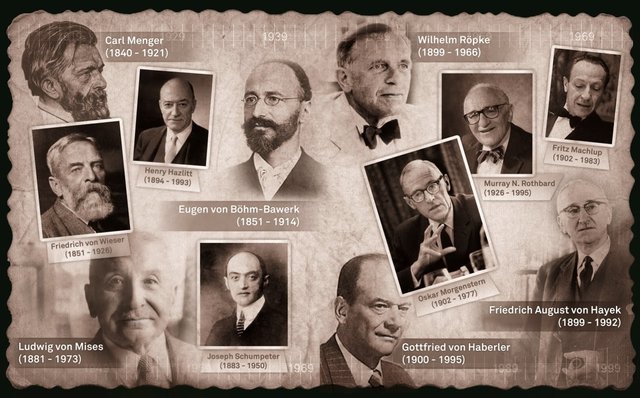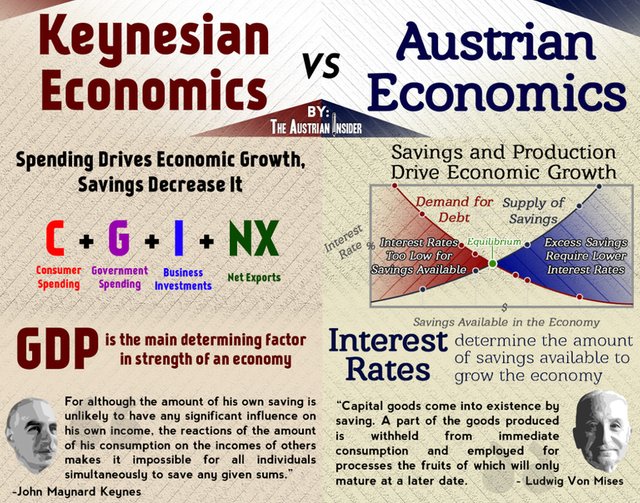What Is Austrian Economics?

Austrian Economics has become more well known since the advent of the internet, and the work of men like Ron Paul. However, It is still a school of thought that draws confused looks from some people, as it is not the predominant economic theory of today. Yet, it is the one that continually shows itself to be the most accurate.
The Austrian school has its roots in the fifteenth century. Students of St. Thomas Aquinas at the University of Salamanca, in Spain, were searching for a systematic approach to how we interact, negotiate, and purchase goods as human beings. These men observed economic laws, much like we observe natural laws in nature.
They were the first gentlemen to research and record the correlations of supply and demand, inflation of currency, and the effects these items have on a society. Since they focused their research on the effects of the entire society, and not just the royalty, they were staunch advocates of property rights, fewer taxes, and regulations. The matter of utmost importance to these scholars, was creating the ideal environment for enterprise to flourish.
However, these ideas were new, and it took centuries for them to gain traction. The next great strides were not taken till the mid 18th century with the likes of Richard Cantillon, Jean Baptiste Say, and Claude-Frederic Bastiat. Say was a defender of laissez-faire and the industrial revolution, as was Bastiat. These men were schooled in the tradition of the Scholastics and worked to revive the ideals of individualism. Yet, the political powers of the day continued to rule and influence economic theory. It would take another century till a professor from Vienna would finally bring the centuries of work to the forefront.

Carl Menger's Principles of Economics was published in 1871. Menger, the founder of the Austrian School proper, resurrected the Scholastic-French approach to economics, and thus established an economic theory based on liberty and freedom for all peoples.
Menger was a key figure in what is now called the “Marginalist Revolution.” This term refers to the idea, that value - economic value - is not intrinsic to the item that one has, but is subject to the value that the individual has for that item. The person values the item based on how well it satisfies the goals of the individual. If we see a pair of shoes for $20, and determine that the shoes are worth more to us than the $20 in our pocket, than we hand over our $20. Value then depends on the judgement of each person, which is determined by his most pressing need.
Perhaps the most important Austrian economist in the history of the economic theory is Ludwig von Mises– he single handedly carried Austrian economics through the rise of the Federal Reserve, the two world wars, and the threat of communism. Mises’ two most important contributions to economics included the “Austrian Business Cycle Theory”, and his insights into the impossibility of economic order in a socialist ideal.
"Austrian economics is set apart from other schools primarily in its approach to economic science.... the Austrian School is not a set of ideas about the best course of action to be taken by governments, as if economics was merely about policy proposals. Rather, the Austrian School analyzes economics through the lens of the individual human actor, who is a decision maker and profit seeker in every one of his actions in the real world. It is through this lens –and not mathematical models and presumptions about “equilibrium levels”– that makes Austrian economics so unique, and yet so attractive." -C. Jay Engel

We have witnessed the dangers of the Keynesian economic theory over the last century. It is nearly impossible to stop the spending machine once it is started. We are encouraged to purchase those $20 shoes whether we have the $20 or not. This simply continues the cycle of production, but neglects the foundation of real growth.
The focus, as the Scholastics originally studied, is the individual - whereas Keynesian theory and others, are more focused on the good of the whole. In order to keep up the good of the whole, spending must continue. This is difficult to do if folks want to save money, thus taxes and an increase in the currency supply become attractive avenues through which to grow an economy.
The imbalance of weights begins to take effect once currency supply increases. We are in the middle of this imbalance now as governments around the world are deeply in debt from spending and borrowing. The imbalance can be fixed if we would allow free markets and free people to make decisions without coercion. When any of us meddle in an affair that we are a third party to, the outcome can never be good. The government is a third party to any economic transaction. The less government we have, and the more freedom we have as individuals to save and invest as we see fit, the healthier our economy will be.
 me for more great content.
me for more great content. Image Sources: 1-2-3
Sources: C. Jay quote
Mises Institute
I am glad somebody finally explains to me . Hello from Vienna !
Glad I could help. That is a beautiful place!
very good post , let me say it again
very good post
i had no idea about austrian school and their way of understanding economics ( so i learned something new today :) ) thanks a lot ( i read it all :P )
Haha. Thank you! I am glad you enjoyed it. :)
austrian for the win
Yes! :)
Very informative and interesting - Thanks!
You're quite welcome!
yup
This post has been ranked within the top 80 most undervalued posts in the first half of Feb 15. We estimate that this post is undervalued by $2.04 as compared to a scenario in which every voter had an equal say.
See the full rankings and details in The Daily Tribune: Feb 15 - Part I. You can also read about some of our methodology, data analysis and technical details in our initial post.
If you are the author and would prefer not to receive these comments, simply reply "Stop" to this comment.
Hi @lydon.sipe, I just stopped back to let you know your post was one of my favourite reads yesterday and I included it in my Steemit Ramble. You can read what I wrote about your post here.
You are quite kind. I enjoy your articles for finding great posts to read. There is so much to learn here on Steemit.
thank you @lydon.sipe ... There is a lot to learn on Steemit
hmmm...interesting but beyond my expertise, but I'll mention it to @creatr and I'm sure he'll have some interesting comment upon it.
Haha. It is not my best from a writing stand point. I tried to do too much and ran out of time to accomplish it.
Thank you for always taking the time to comment John. I thoroughly enjoy the comradery between @creatr, yourself, and I.
I always look for your posts, just after Creatr's, of course ...LOL!!
Lol, well of course. ;)
I can't believe 142 votes only netted you $1.27. Great Post, I am an avid fan of free market economy, (Austrian Economics), is the way to go. I am going to subscribe, please follow as I will have similar posts.
@salt2health